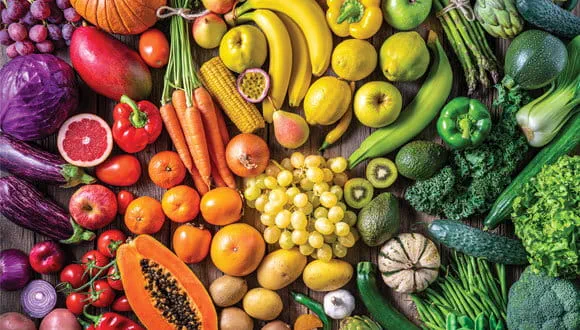The Role of Antioxidants in Cancer Prevention
Hey there! Are you interested in learning how antioxidants can play a role in cancer prevention? Antioxidants are powerful compounds that help protect your cells from damage caused by free radicals. Let's explore how antioxidants work and which foods you can include in your diet to reduce your risk of cancer.
What Are Antioxidants?
Antioxidants are molecules that help neutralize free radicals, which are unstable atoms that can cause damage to cells and contribute to the development of diseases, including cancer. Free radicals can be produced by various factors such as pollution, radiation, tobacco smoke, and the body's normal metabolic processes.
By neutralizing free radicals, antioxidants help prevent cellular damage and reduce the risk of chronic diseases, including cancer. Antioxidants are found in various foods, particularly fruits and vegetables, and include vitamins C and E, selenium, and carotenoids.
How Antioxidants Help Prevent Cancer
Antioxidants play a crucial role in protecting cells from oxidative stress, which can lead to DNA damage and the development of cancer. Here are some ways antioxidants help prevent cancer:
- Neutralizing Free Radicals: Antioxidants neutralize free radicals, reducing the potential for cellular damage and mutations that can lead to cancer.
- Boosting the Immune System: Antioxidants support the immune system, helping it detect and destroy cancerous cells before they can grow and spread.
- Preventing DNA Damage: Antioxidants help protect DNA from oxidative damage, which can prevent mutations that lead to cancer.
- Reducing Inflammation: Chronic inflammation is linked to an increased risk of cancer. Antioxidants have anti-inflammatory properties that can help reduce inflammation and lower cancer risk.
Foods Rich in Antioxidants
Including antioxidant-rich foods in your diet can help reduce your risk of cancer. Here are some top sources of antioxidants:
Berries
Berries, such as blueberries, strawberries, raspberries, and blackberries, are rich in antioxidants like vitamin C and anthocyanins. These compounds help protect cells from damage and reduce inflammation.
Leafy Greens
Leafy greens, such as spinach, kale, and Swiss chard, are packed with vitamins A, C, and E, as well as carotenoids and other antioxidants. These nutrients support overall health and help protect against cancer.
Nuts and Seeds
Nuts and seeds, such as almonds, walnuts, sunflower seeds, and flaxseeds, are excellent sources of vitamin E and other antioxidants. They also provide healthy fats and fiber, which contribute to overall health.
Citrus Fruits
Citrus fruits, such as oranges, lemons, and grapefruits, are high in vitamin C, a potent antioxidant that helps protect cells from damage and supports the immune system.
Tomatoes
Tomatoes are rich in lycopene, a powerful antioxidant that has been shown to reduce the risk of certain cancers, including prostate cancer. Cooking tomatoes can increase the bioavailability of lycopene, making it easier for your body to absorb.
Cruciferous Vegetables
Cruciferous vegetables, such as broccoli, cauliflower, Brussels sprouts, and cabbage, contain compounds like sulforaphane and indoles that have been shown to have anti-cancer properties. These vegetables help detoxify the body and reduce inflammation.
Green Tea
Green tea is rich in catechins, particularly epigallocatechin gallate (EGCG), which have strong antioxidant and anti-cancer properties. Drinking green tea regularly can help protect against various types of cancer.
Garlic
Garlic contains sulfur compounds that have been shown to reduce the risk of cancer. It has antioxidant and anti-inflammatory properties that help protect cells from damage.
Carrots
Carrots are high in beta-carotene, an antioxidant that the body converts to vitamin A. Beta-carotene helps protect cells from damage and supports the immune system.
Turmeric
Turmeric contains curcumin, a compound with potent antioxidant and anti-inflammatory properties. Curcumin has been shown to reduce the risk of certain cancers and inhibit the growth of cancer cells.
Lifestyle Tips for Maximizing Antioxidant Intake
In addition to including antioxidant-rich foods in your diet, here are some lifestyle tips to help maximize your antioxidant intake and reduce your risk of cancer:
- Eat a Rainbow: Include a variety of colorful fruits and vegetables in your diet to ensure you're getting a wide range of antioxidants and nutrients.
- Choose Whole Foods: Focus on whole, unprocessed foods that are naturally rich in antioxidants and free from additives and preservatives.
- Stay Hydrated: Drink plenty of water and herbal teas to support overall health and help flush out toxins from your body.
- Limit Alcohol and Tobacco: Reduce or eliminate your intake of alcohol and tobacco, as they can increase the production of free radicals and contribute to cancer risk.
- Exercise Regularly: Engage in regular physical activity to boost your immune system, reduce inflammation, and support overall health.
- Manage Stress: Practice stress-reducing techniques such as meditation, yoga, and deep breathing to help lower inflammation and support your immune system.
Conclusion
Antioxidants play a crucial role in cancer prevention by protecting cells from damage, boosting the immune system, preventing DNA damage, and reducing inflammation. By including antioxidant-rich foods such as berries, leafy greens, nuts and seeds, citrus fruits, tomatoes, cruciferous vegetables, green tea, garlic, carrots, and turmeric in your diet, you can support your body's natural defense mechanisms and reduce your risk of cancer. Combine these dietary changes with a healthy lifestyle to maximize your antioxidant intake and protect your overall health. Stay healthy and take care!










